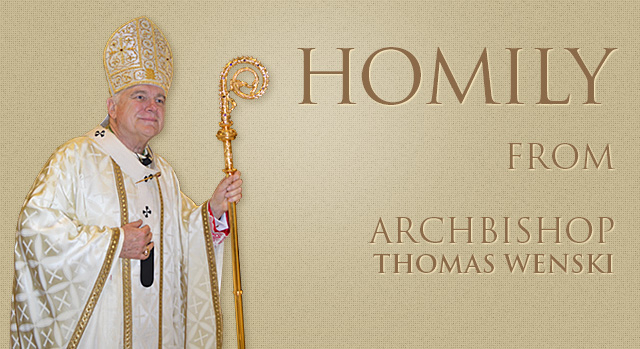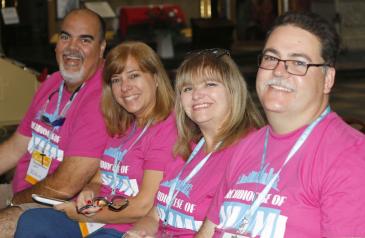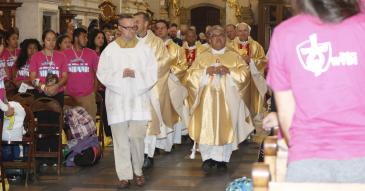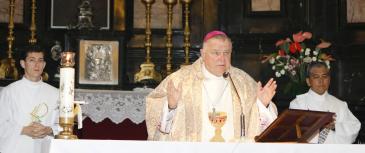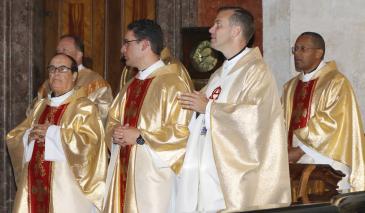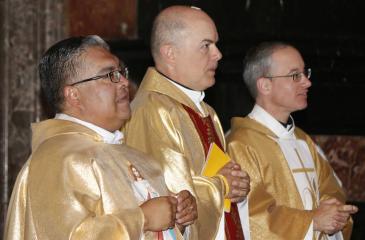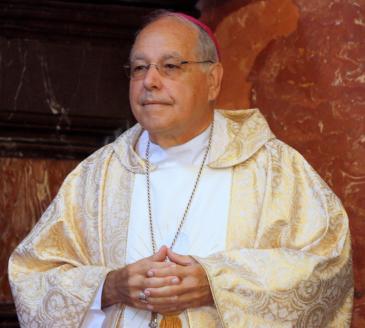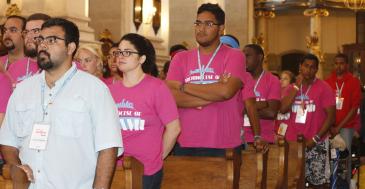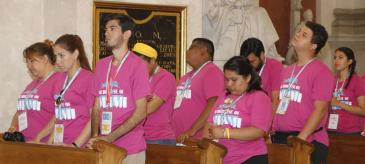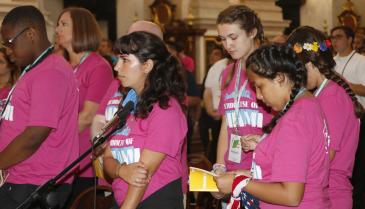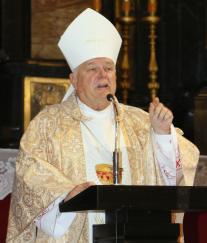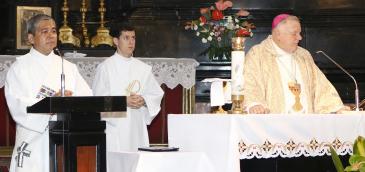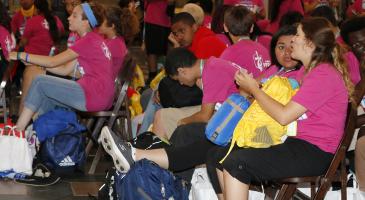By Archbishop Thomas Wenski - The Archdiocese of Miami
Photography: Ana Rodriguez-Soto
Homily by Archbishop Thomas Wenski at Mass with pilgrims from the Archdiocese of Miami and the Diocese of St. Augustine at Sts. Peter and Paul Church in Krakow, Poland. July 30, 2016.
Today's Scripture readings underscore the costs of discipleship. In the first reading, the prophet Jeremiah experienced persecution and is threatened with death for speaking the truth. He gets a reprieve but in the Gospel reading, John is executed by Herod for speaking the truth. And his death is a foreshadowing of Jesus' own death for he, too, would be executed by Pontius Pilate, who like Herod was politically strong but morally weak.
While Herod was somewhat attracted by John's preaching, he's not happy to be called on the carpet by John. That's why he got put into prison. Herod had left his own wife and taken up with his brother's - which according to Jewish teachings was tantamount to incest. John's telling the truth about this relationship was not politically correct - and so the politician punished him even though John remained popular among the people, which protected him for a while from anything worse. Until that birthday party....
The more evil a society becomes the more likely its members will seek to silence the righteous whose words or lives reproach its character. The more evil a society becomes the less it will be willing to tolerate those who dissent from participating in its evil. We see this today in our country. In earlier times, those who disagree with abortion, for example, were granted the right to conscientious objection. In other words, you would not be forced to violate your conscience by participating in one. Nurses, doctors were protected; even taxpayers were protected by various types of legislation, like the Hyde or Weldon amendments, that forbade tax money from directly subsidizing or paying for abortions. Today, as a society we've become less tolerant: if you defend traditional marriage, you are considered a "bigot," a "hater." And even nuns who run nursing homes are threatened with fines that would put them out of business if they do not go along with the government's mandate to cover abortion and abortion-inducing drugs in their health plans.
Earlier this week you visited Auschwitz and yesterday Pope Francis visited. (Some of you will visit there in a few days.) The Pope walked through the death camp in silence - as you did (or will). Words fail in the face of unspeakable horror. When words fail, silence speaks more eloquently. What happened there - and in other death camps in Germany and in German-occupied Poland - was perhaps unparalleled in its horror.
But we see continued examples of man's inhumanity to his fellow man today, in terrorist attacks at home and in Western Europe. We see it in the ongoing persecution of Christians in the Middle East. For a young girl to ask for the head of John the Baptist on a platter seems to be a very barbaric act from a more primitive time, yet beheadings today are not uncommon. And earlier this week an elderly priest's throat was slit by someone claiming to act in the name of ISIS.
Pope Benedict also visited Auschwitz as did St. John Paul II. At that time, Pope Benedict said: "By eradicating this people, those purveyors of violence wanted, deep down, to kill the God who had called upon Abraham, who had spoken on Mount Sinai and established the still valid principles of humanity there." And he continued: "Ultimately, the destruction of Israel was intended as an unearthing of the foundation upon which Christian faith rests, and as its replacement by a new, artificial faith in the rule of man, the rule of the strong." When truth becomes merely one's opinion, the strong will set the rules: might makes right.
Pope Francis, after walking through the death camp, met with some survivors and some Polish Catholics who are considered by the Jews as "members of the righteous among the Gentiles." They were people who helped hide or rescue Jews from their persecutors. In meeting with these people, Pope Francis reminded us that brutality can elicit both the worst and the best of the human spirit. St. John Paul when he visited Auschwitz in 1979 - returning to Poland shortly after being elected Pope - also visited the cell where Maximilian Kolbe had died together with a group of men condemned as retaliation for the escape of a prisoner. Pope John Paul II left there a Paschal Candle, the symbol of Christ's resurrection, to remind us that evil does not have the last word in the history of mankind. Sin, death, Satan himself are conquered by Christ's passion, death and resurrection.
Along our life's journey, as followers of Christ, we are called to witness to truth, to justice and to mercy. We walk with Jesus with our eyes focused on God; like Jesus we must seek to do the Father's will. But in a world turned away from God, a world that wishes to "kill" God, those who turn towards God will face opposition. Sometimes our facing towards God will be taken by those who have turned against him as an insult; sometimes as a provocation or as being subversive to the established order.
It is too easy to take the path of least resistance, giving in to expediency or convenience. This Year of Mercy reminds us that Jesus understands our human weakness. He gives the gifts of his Holy Spirit to strengthen us and give us courage. His mercy does not deny the reality of sin - for if there is no sin, there is no need for mercy. But his mercy reminds us that we are more than the sum total of our failures. And in his loving kindness we can find forgiveness and healing. That is why you will find hundreds of priests sitting at confessionals to hear your confessions, so that God's mercy may touch you in the sacrament of reconciliation.
Tomorrow at Mass, Pope Francis will ask us to renew our baptismal promises, to renounce Satan and to reject his false promises and to turn away from sin. Your "yes" is a "yes" to discipleship, a "yes" in which you promise to walk with Jesus with your face towards the Merciful Father.
To be a disciple is not easy - but it is also not a burden. It is a gift that calls forth from us our very best. To know Jesus and his truth is the best thing that could ever happen to us. The martyrs - and here we are in a church that is dedicated to two great martyrs, Saints Peter and Paul - the martyrs remind us that this gift is worth living for and even dying for. And it is worth sharing with others. On this Saturday in which we also remember Mary, the first disciple, let us ask her to intercede for us and help make us worthy of the promises of Christ.
